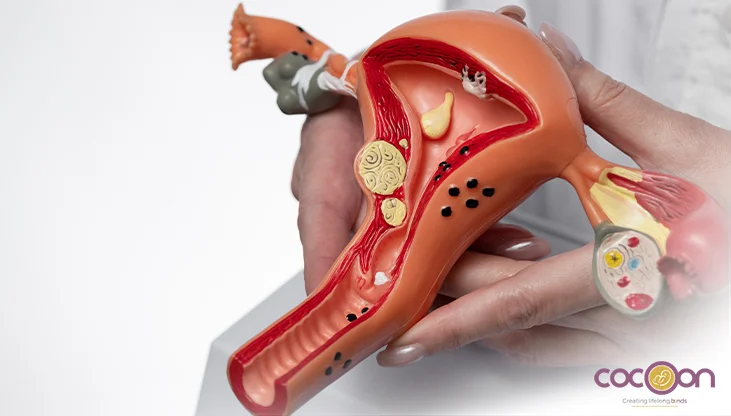As a woman, over time, your body goes through multiple changes. All your life, you give your best to balance your hormones and reproductive health. But still, hormones, genetics, or even pelvic floor issues can sometimes cause health conditions that require gynecological surgery.
Some of the conditions that require surgery are fibroids, ovarian cysts, endometriosis, chronic pelvic pain, or even fertility concerns. It’s normal to feel anxious, but with the right gynae surgery preparation, you can move ahead with the procedure with confidence.
Before surgery, your doctor may suggest preoperative tests, fasting, or adjusting medications. During the surgery, trust the medical team, as they’re equipped and trained to ensure your safety and comfort. And after surgery, proper rest and postoperative care are required.
If you are undergoing any of the gynecological surgeries, know that with the right preparation, knowledge, care, support, and patience, you can recover faster and get stronger.
Read this article to know all about “Preparing for Gynae Surgery: Before, During & After Care.”
What is Gynecologic Surgery?
Gynecologic surgery is the operation done on a female’s reproductive organs, such as the uterus, ovaries, fallopian tubes, or cervix. These surgeries can diagnose, treat, or manage issues like fibroids, cysts, endometriosis, or even certain cancers. Some common procedures are hysterectomy, laparoscopy, and surgery for infertility.
Your doctors recommend gynecologic surgery after the failure of medicines or non-surgical treatments. It helps women improve health, ease pain, and regain normal reproductive function.
What are the types of gynecological surgery?
The following are some types of gynecological surgeries. They depend on the type of gynecological issues you may have.
- Loop Electrosurgical Excision Procedure (LEEP): a minimally invasive procedure to remove abnormal cervical cell tissue.
- Hysteroscopy: diagnose and treat conditions like uterine fibroids, polyps, and abnormal bleeding.
- Hysterectomy: a surgical procedure to remove the uterus due to conditions like fibroids, pelvic pain, or cancer.
- Colposcopy: a diagnostic procedure to examine abnormalities in the cervix, vagina, and vulva.
- Dilation and Curettage: a surgical procedure to diagnose and treat conditions like abnormal bleeding. It can remove tissue after a miscarriage.
- Myomectomy: a surgical process to remove fibroids (or myomas) from the uterus (womb) while keeping the uterus itself.
If your doctor has recommended any of the gynecological procedures based on your symptoms or reproductive parts affected. Then you should know how to prepare for before, during, and after care for gynecological surgery.
Note: All the information given for gynecological surgery is for informational purposes. Your doctor will only decide whether or not you require any surgery. Follow your doctor’s advice.
A. Beore Gynecological Surgery
Follow these points before gynecological surgery:
- Discuss with your doctor about which medicines to take or stop, particularly blood thinners, about a week before surgery.
- Complete all required tests.
- Confirm your surgery date and arrival time.
- Make arrangements for someone to drive you home and provide assistance after surgery.
- Don’t eat or drink anything for at least 8 hours before gynae surgery, but you might consume clear liquids a few hours before as advised.
- Shower well, wear loose, clean clothes, and keep your jewelry and makeup at home.
- Bring your insurance card.
B. During Gynecological Surgery
During the surgery you can go through the following steps that your doctor will make sure of:
- The patient is positioned comfortably.
- A catheter is inserted to keep the bladder empty.
- A surgical team makes an incision to access the reproductive organs (a small cut in the abdomen or sometimes via the vagina).
- The surgeon carefully moves tissues to reach the uterus, ovaries, or other organs that require treatment.
- The affected reproductive area is carefully treated.
- The procedure can involve removing growths, repairing damage, or removing an organ like the uterus.
To ensure a smooth gynecological surgery, you need to keep the following things in mind:
- Take a good shower using antibacterial soap as per your doctor’s instructions. But don’t shave anywhere.
- Wear clean, loose, and comfortable clothes. Do not put on makeup, lotions, or jewelry.
- Take the prescribed medicine as your doctor instructs, with a small sip of water.
- You can only drink clear liquids like water or juice until 2 hours before leaving for surgery.
- Avoid solid food completely.
- Bring surgery essential items such as photo ID, insurance card, and a list of your medicines, and arrange for a responsible person to drive you back home.
CLEAR LIQUID DIET FOR 1 DAY PRIOR TO SURGERY DATE
| These clear liquid items are allowed | Not allowed |
|
|
Note: It is important to stay well hydrated during your bowel prep, so please drink many of the allowed clear liquids.
C, After Gynecological Surgery
For smooth recovery after your surgery, you need to follow the gynecologic surgery care:
- Rest well and avoid heavy lifting or strenuous activities for several weeks until your doctor gives you the green signal.
- Start gentle walking slowly as soon as possible to avoid blood clots and help bowel recovery.
- Take prescribed pain medicines.
- Follow wound care instructions to prevent any complications from infection.
- Drink plenty of fluids.
- Eat a balanced diet with soft foods to support faster healing.
Note: Go for all follow-up appointments as decided by your doctor to monitor recovery. Notify any unusual symptoms such as fever, heavy bleeding, or severe pain.
Which gynecological issues require gynae surgery?
Gynecological issues requiring surgery are:
- Fibroids
- Ovarian cysts
- Endometriosis
- Endometrial, cervical, ovarian cancers
- Pelvic organ prolapse
- Chronic pelvic pain
- Pregnancy complications, such as ectopic pregnancy or blocked fallopian tubes
Best Gynae Surgery Services: Cocoon Hospital
Cocoon Hospital provides expert gynecologic surgery with a skilled team experienced in handling uterine fibroids, urinary incontinence, pain, abnormal bleeding, and early pregnancy complications.
We provide tailored treatment and multidisciplinary care by collaborating with urogynecology, oncology, and reproductive specialists. We always believe in a patient-centric approach. Our advanced women’s surgical health care ensures precise diagnosis and effective treatment for all gynecological issues.
Cocoon’s Gynaecology Services and Procedures are:
- Minimally invasive gynecologic surgery
- Ovarian cysts
- Contraceptive and pre-conception counseling
- Menopause
- Endometriosis
- Menstrual disorders
- Uro-gynaecology
- Onco Gynecology
- Preventive health checks – the well women check-up
FAQs
1. Why might you need gynecologic surgery?
You might need gynecologic surgery to address conditions like fibroids, heavy bleeding, pelvic pain, or ovarian cysts. The surgery may help improve health and relieve symptoms when other medications or nonsurgical methods don’t work.
2. What are the risks of gynecologic surgery?
Under a proper doctor’s guidance, they are safe and effective. Some common risks are infection, bleeding, blood clots, or reactions to anesthesia. Your doctor will take steps to minimize them.
3. What are the benefits of gynecologic surgery?
Gynecologic surgery can relieve pain, stop abnormal bleeding, and remove abnormal growths. They can help improve fertility and overall quality of life.
4. How long does gynae surgery take?
The duration of gynecologic surgery depends on the procedure type and complexity. However, it usually takes between 30 minutes and 3 hours.
5. What is the most common female surgery?
The most common female surgery is hysterectomy. This involves the removal of the uterus, often done to treat fibroids, heavy bleeding, or cancer.

















